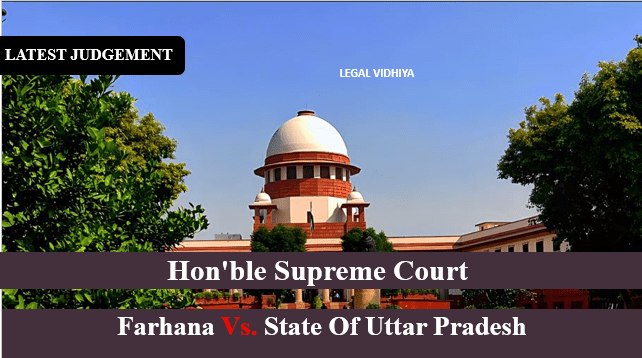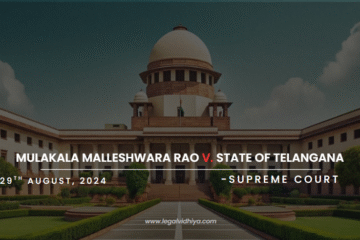
| CITATION | 2024 (SC) 131 |
| DATE OF JUDGEMENT | 19th February 2024 |
| COURT | Supreme Court of India |
| APPEALLENT | Farhana |
| RESPONDENT | State of Uttar Pradesh |
| BENCH | B.R.Gavai |
INTRODUCTION
This case is about the validity of the FIR registered against the appellants, Farhana and Sadarul Islam, under the Uttar Pradesh Gangsters and Anti-Social Activities (Prevention) Act, 1986 (hereinafter referred to as the Gangsters Act). The appellants challenged the FIR before the High Court of Allahabad, contending that they were exonerated in the predicate offences covered by Section 2 (b) (i) of the Gangsters Act, and therefore, the FIR was liable to be quashed. The High Court dismissed their petitions, holding that the FIR was based on the gang chart prepared by the police after obtaining prior approval from the District Magistrate, and that the exoneration in the predicate offences did not affect the prosecution under the Gangsters Act. The appellants have now approached the Supreme Court of India, seeking to quash the FIR and the proceedings under the Gangsters Act. The main issue before the Supreme Court is whether the proceedings of the FIR under the provisions of the Gangsters Act and the prosecution of the accused can be continued in spite of exoneration in the predicate offences. This case involves the interpretation of the Gangsters Act and its impact on the fundamental rights of the appellants. It also raises questions about the role of the police and the judiciary in dealing with the menace of gangsterism and anti-social activities in the state of Uttar Pradesh.
FACTS OF THE CASE
- The case involves appellants Farhana and Sadarul Islam challenging orders dated 14th November, 2022, and 6th December, 2022, passed by the Division Bench of the High Court of Judicature at Allahabad. These orders rejected Criminal Miscellaneous Writ Petition Nos. 16653 of 2022 and 18326 of 2022 filed by the appellants, seeking to quash Case Crime No. 424 of 2022 registered against them under Section 3(1) of the Uttar Pradesh Gangsters and Anti-Social Activities (Prevention) Act, 1986 Bhognipur (hereafter referred to as the ‘Gangsters Act’) at Police Station-, District-Kanpur Dehat.
- The primary contention revolves around whether proceedings under the Gangsters Act and the prosecution of the accused can continue despite exoneration in the predicate offences covered by Section 2(b)(i) of the Gangsters Act. Section 2(b)(i) defines a “Gang” as a group involved in certain specified offences under the Indian Penal Code (IPC).
- The FIR against the appellants was registered based on allegations that they were members of a gang led by Puskal Parag Dubey and were involved in various criminal cases. These cases included Crime Case No. 190 of 2021 and Crime Case No. 173 of 2019 under Sections 420, 467, 468, 471, 323, 504, and 506 IPC. The FIR stated that the appellants were liable to be prosecuted under the Gangsters Act due to their involvement in these cases.
- The appellants approached the High Court through criminal writ petitions, contending that as only one case was registered against them at the time of filing the FIR, proceedings under Section 3(1) of the Gangsters Act should be quashed.
- The Division Bench of the High Court rejected the writ petitions, citing the precedent set in the case of Shraddha Gupta v. State of Uttar Pradesh, which established that prosecution under the Gangsters Act could be initiated even against individuals involved in a single offence covered by the Act. The appellants subsequently appealed these decisions to the Supreme Court.
- In their appeal to the Supreme Court, the appellants challenge the interpretation of the Gangsters Act by the High Court and argue for the quashing of proceedings against them under the Act. They contend that since only one case was registered against them at the time, the invocation of the Gangsters Act was unwarranted.
ISSUES RAISED
- Can the gangster`s act be invoked against individuals with only a single case registered against them?
- How did the case impact the human right`s situation in India particularly with regards to police misconduct and judicial accountability?
- Has there any subsequent legal action or policy changes in response to the issue raised in this case?
ARGUMENTS
Petitioner`s Arguments: Learned counsel for the appellants submitted that the decision rendered in the case of Shraddha Gupta(supra) would not apply to the case of the appellants because in the intervening period, proceedings of both the criminal cases being Crime Case No. 173 of 2019 and Crime Case No. 190 of 2021 have been quashed in the following manner:- (i) Crime Case No. 173 of 2019 registered against both the appellants, namely, Farhana and Sadarul Islam was quashed by the High Court of Judicature at Allahabad, vide order dated 3rd March, 2023, passed in Application under Section 482 No. 7228 of 2023; (ii) Crime Case No. 190 of 2021 registered against appellant Sadarul Islam was also quashed by the High Court of Judicature at Allahabad vide order dated 18th 2022 SCCOnline SC 514 October, 2023, passed in Application under Section 482 No. 18493 of 2023. On these grounds, learned counsel for the appellants urged that there being no on-going prosecution of the appellants for any offence(s) involving anti-social activities as defined in Section 2(b)(i) of the Gangsters Act, the continuation of the proceedings of the criminal case and the charge-sheet filed against the appellants pursuant to investigation of Case Crime No. 424 of 2022 under the Gangsters Act is absolutely unjustified and tantamounts to abuse of process of the Court. Hence, the very foundation for continuing the prosecution of the appellants under the provisions of the Gangsters Act stands struck off and as a consequence, the continued prosecution of the appellants for the said offence is unjustified and tantamounts to abuse of the process of Court.
Respondent`s Arguments: Per contra, learned counsel representing the State urged that there is no dispute that at the time of registration of FIR, the appellants were being prosecuted for multiple FIRs involving anti- social offences as defined under Section 2(b)(i) of the Gangsters Act and hence, the proceedings of the FIR under the Gangsters Act cannot be quashed in light of decision rendered by this Court in the case of Shraddha Gupta(supra).
JUDGEMENTS
MEHTA.J-
- Leave granted.
- Heard learned counsel representing the parties and perused the material available on record.
- The appellants-Farhana and Sadarul Islam have filed the instant appeals for assailing the orders dated 14-11-2022 and 06-12-2022 passed by the Division Bench of the High Court of Judicature at Allahabad rejecting Criminal Miscellaneous Writ Petition No`s 16653 of 2022 and 18326 of 2022 preferred by the applicants respectively, with a prayer to quash the Case Crime no; 424 of 2022 registered against the applicants for the offence punishable under section 3 (1) of the Uttar Pradesh Gangsters and Anti-Social activities (Prevention) Act, 1986(for short “Gangsters Act”) at Police Station-Bhognipur,District-Kanpur Dehat.
ANALYSIS
The appellants assailed the aforesaid FIR by way of filing the captioned criminal writ petitions before the High Court on the premise that as on the date of the filing of the FIR, only one case was registered against them and hence, the proceedings under Section 3(1) of the Gangsters Act were liable to be quashed and set aside. From a bare perusal of Section 2(b)(i) of the Gangsters Act, it would become apparent that the person alleged to be the member of the gang should be found indulging in anti-social activities which would be covered under the offences punishable under Chapters XVI, or XVII or XXII IPC. There is no dispute that the case set up by the prosecution against the appellants insofar as the offences under the Gangsters Act are concerned, is limited to Section 2(b)(i) reproduced supra and none of the other clauses of the provision have been pressed into service for the proposed prosecution. Needless to say that for framing a charge for the offence under the Gangsters Act and for continuing the prosecution of the accused under the above provisions, the prosecution would be required to clearly state that the appellants are being prosecuted for any one or more offences covered by anti-social activities as defined under Section 2(b).
CONCLUSION
There being no dispute that in the proceedings of the sole FIR registered against the appellants for the offences under Chapter XVII IPC being Crime Case No. 173 of 2019, the appellants stand exonerated with the quashing of the said FIR by the High Court of Judicature at Allahabad by exercising the powers under Section 482 of Code of Criminal Procedure, 1973, vide order dated 3rd March, 2023 passed in Application No. 7228 of 2023. As a consequence of the discussion made herein above, the impugned orders dated 14th November, 2022 and 6th December, 2022 passed by the High Court of Judicature at Allahabad are quashed and set aside. Resultantly, the impugned FIR being Crime Case No.424 of 2022 for offence punishable under Section 3(1) of the Gangsters Act, registered at Police Station- Bhognipur, District- Kanpur Dehat and all the proceedings sought to be taken thereunder against the appellants are hereby quashed.
REFERENCE
- SCC Online
- https://indiankanoon.org/doc/188421943/#:~:text=State%20of%20Uttar%20Pradesh%20and,the%20criminal%20writ%20petitions%20by
- https://www.casemine.com/judgement/in/65685b66cfdd1f51a54af243
Written by PRIYANCE SHARMA an intern under legal vidhiya
Disclaimer: The materials provided herein are intended solely for informational purposes. Accessing or using the site or the materials does not establish an attorney-client relationship. The information presented on this site is not to be construed as legal or professional advice, and it should not be relied upon for such purposes or used as a substitute for advice from a licensed attorney in your state. Additionally, the viewpoint presented by the author is of a personal nature.




0 Comments